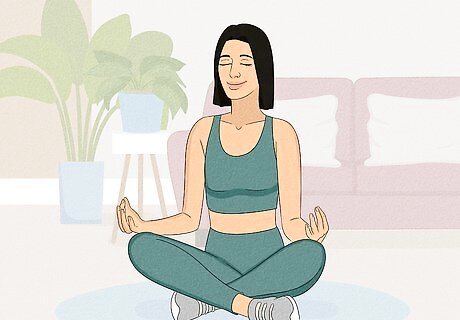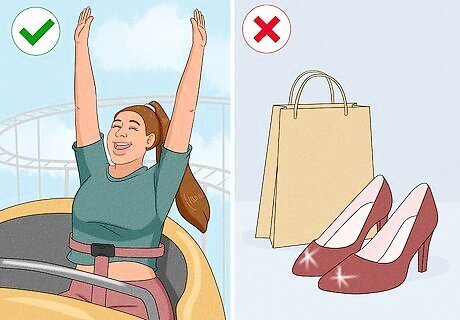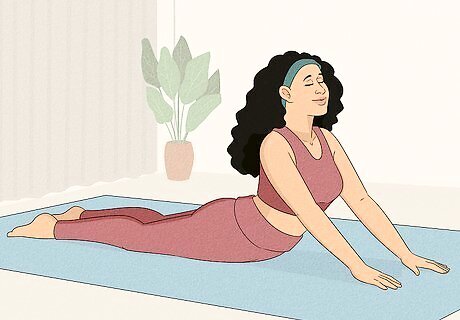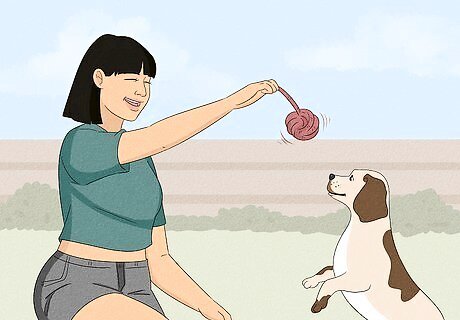
views
Creating a Positive Mindset

Express gratitude for the good things in your life. Being grateful for the things you have can change your life. It helps you focus on what’s going well so you’re less likely to feel depressed about your life. Take 1-2 minutes to savor positive moments. Additionally, thank people when they do nice things for you. Keep a gratitude journal or list 3-5 things you’re grateful for each day. Your gratitude list might include, “my cat,” “a job I love,” “a best friend I can call anytime,” “a cozy bed,” and “good food to eat.” When you're feeling down, look back over your gratitude list to help you feel better.

Replace negative thoughts with positive self-talk. Negative thoughts can make it hard to feel happy, but you can change them. When you notice negative thoughts, challenge their accuracy. Then, replace the thought with a positive or neutral thought. Additionally, make positive statements to yourself throughout your day. Let's say you catch yourself thinking, “I’m so ugly.” You might replace this thought with, “I can’t be ugly because everyone is beautiful in their own way,” or “I’m unique, and that makes me beautiful.” Use positive affirmations like, “I can do this,” “I’m enough,” or “If I try, I’m already successful.”Tip: Talk to yourself the same way you’d talk to your best friend. For instance, if your friend messed up a presentation at work, you’d likely say something like, “These things happen sometimes. You’ll do better in your next presentation.”

Compliment yourself at least once a day. Focus on what you’re doing well by giving yourself regular compliments. Point out your best features, celebrate your talents, and recognize your accomplishments. This will help you think positively about yourself. Say, “This outfit looks great on me,” “I did an amazing job in that presentation,” “I’m such a great writer,” or “I love that I’m so compassionate.”

Stop comparing yourself to other people. Everyone is on their own journey, so it’s unfair to you to measure your progress by looking at what others have accomplished. Don’t worry about what other people are doing. Instead, compare yourself to where you were in the past. This will help you see how you’re progressing. For instance, don’t worry if all your friends seem to be further along in their careers. Your time will come. Instead, compare your progress to where you were last year.

Look for something positive when you’re facing an obstacle. Hardships and setbacks are part of life, and no one is immune from them. When you’re facing a problem, do your best to find a silver lining. This can help you feel better in the moment and may help you grow from your experiences. For instance, let’s say you’ve lost your job. This is a really difficult experience, but you might focus on it as an opportunity to switch careers.Variation: Life sometimes brings very painful experiences, like the death of a pet. You don’t need to find something good in these situations. Take your time to grieve, and express your emotions to help them pass.

Use mindfulness to help you focus on the present. Dwelling on your past and stressing about the future can negatively affect your mood. Being mindful can help you stay focused on the present so you avoid unnecessary overthinking. Here are some ways to be more mindful: Meditate for 10 minutes. Engage your 5 senses. Do just one thing at a time. Focus on how your feet move against the ground.
Being Your Best Self

Live according to your personal values. Ignoring your core beliefs can make you feel distressed or conflicted. Discover your personal values by listing the things that are important to you, identifying times you’ve felt truly happy, and deciding what you really want in life. Then, align your lifestyle with your values so that you can be the person you want to be. For instance, you might value helping others and being creative. To align with these values, you might choose a career in nursing and paint as a hobby. Additionally, you might make conscientious decisions so that you don’t hurt others.

Do at least one activity you enjoy every day. Having fun every day helps you enjoy your life more. Make a list of activities that make you feel happy. Then, schedule time every day to do something on your list. This can help you enjoy life more and can help you become your best self. For instance, engage in a hobby, hang out with your friends, play a board game, walk your pet, take a hot bath, read a book, see a movie, go to a concert, or try a new recipe. If there’s something you’ve always wanted to do, try it! For instance, take a class to learn how to paint or watch online tutorials to learn how to dance.

Identify your strengths to help you have self confidence. It’s easier to feel happy if you’re proud of who you are, and recognizing your strengths can help. Make a list of your talents, skills, and knowledge. Then, review it often to help you remember how awesome you are. Your strengths might include things like solving math problems, writing, singing, or competing in athletics. Additionally, you might have people skills, analytical skills, or critical thinking skills. Similarly, you might be very creative or able to work collaboratively with people.

Work on improving your weaknesses so you can overcome them. Everyone has weaknesses, so don’t feel bad about yours. If your weaknesses bother you, try to improve them by learning new skills or trying something different. In time, you might be able to improve yourself. For instance, let’s say you have trouble with public speaking. You might join Toastmasters or take an improv class to get better at it. Similarly, you might be unhappy with your fitness level. To improve yourself, you might start a workout program.

Express your emotions so they don’t get bottled up. Your feelings are super important, so don’t try to hide them. Ignoring your emotions can actually make them become more intense. Instead, choose a healthy way to release your emotions. Here are some options: Talk to someone. Write in a journal. Do something creative. Exercise.

Spend your money on experiences rather than things. Buying something you really want is fun, but it won’t lead to lasting happiness. Experiences bring you more joy than items, so use your spending money to pay for fun activities or trips. For more enjoyment, do things with people you care about. For instance, you might choose a game of mini golf over a new shirt. You should still buy items you need, like a computer for school or face wash to keep your skin clean. Don’t feel guilty for buying these types of items.
Building a Support System

Surround yourself with positive people. Hanging out with positive people can boost your mood. Identify the people in your life who make you feel uplifted, then spend more time with them. Invite them to hang out one-on-one, text them, and organize group outings with them. Don’t feel like you have to cut out friends or family who are negative. Instead, simply spend more time with your positive friends and family.

Connect with others so you feel like part of your community. Humans need community, so being around others helps you feel happier. Focus on connecting with the people around you. You can do this by relating to them, finding common ground, or empathizing with what they’re going through. For instance, look for things you have in common with people, even if you seem like very different people. You might both enjoy books, nature, or the same TV show.

Join a club or meetup that’s related to your interests to make friends. If you want more people in your life, go to club or meetup events to spend time around others. Look for a club that focuses on your interests. Then, get to know the people you meet so that you can become friends. For example, you might look for a club that reads science fiction books or a meetup group for people who like drawing.Tip: It takes time for friendships to develop, so don’t worry if you don’t connect with people at first. Keep going to the club or meetup events, and eventually you’ll make friends with people.
Caring for Your Mind and Body

Get at least 7-9 hours of sleep each night so you’re well-rested. Feeling tired can have a negative effect on your mood. Plus, it makes it hard for you to live your best life. To make sure you feel your best, follow a sleep schedule to help you fall asleep easily. Additionally, use a sleep routine to help you go to sleep faster. A good sleep routine might include taking a warm shower, changing into your pajamas, and reading a chapter of a book in bed.

Eat a healthy, balanced diet so your body is nourished. Nutrients give you energy, so eating well helps you feel your best. Eat fresh produce, lean proteins, and complex carbs to help you stay healthy. Additionally, cut out processed foods and sugary snacks because they’re empty calories. Lean proteins include chicken, fish, turkey, tofu, nuts, and meat replacement products. Complex carbs include foods like starchy vegetables and whole grains.

Exercise 30 minutes daily for a positive mood and healthy body. Exercise releases endorphins, which make you feel happy. Additionally, exercise gives you energy and helps you feel your best. Choose an exercise that you enjoy so that it’s easy to do it every day. For instance, walk, run, dance, go to the gym, join a recreational sports team, or go swimming.

Incorporate stress relievers into your day to prevent burnout. Stress is a normal part of life, but it can be harmful if you have too much stress. To help you manage your stress levels, try different stress relievers to see what works for you. Then, incorporate your stress relievers into your daily schedule. You might vent to a friend, do something creative, color in an adult coloring book, engage in a hobby, journal, take a bath, or play with your pet.

Take breaks from social media to avoid feeling like you're missing out. Social media can cause fear of missing out, also called "fomo," because it makes it seem like everyone else is doing better than you are. Keep in mind that what you see on social media is often exaggerated, and you’re only seeing people’s best moments. Additionally, stay off social media when you’re feeling down. It might help to use an app that blocks social media for a period of time every day.

Work with a therapist if you need additional support. You might need additional help to feel happy, and that’s okay. A therapist can help you change your thoughts and behaviors to improve your mood. Ask your doctor to refer you to a therapist or search for one online. Your therapy appointments may be covered by insurance, so check your benefits.Tip: If you have a mental illness, you’re probably going to need treatment to overcome your depression. Don’t feel like you have to do this alone.




















Comments
0 comment